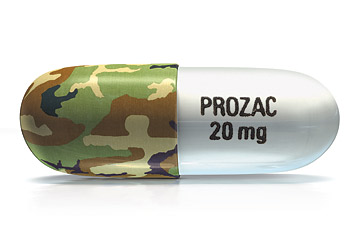
(3 of 3)
Colonel Joseph Horam says antidepressants have made "a striking difference" in the way troops are treated in war. A doctor in the Wyoming Army National Guard, Horam served in Saudi Arabia during the first Gulf War and has been deployed to Iraq twice during this war. "In the Persian Gulf War, we didn't have these medications, so our basic philosophy was 'three hots and a cot'"--giving stressed troops a little rest and relaxation to see if they improved. "If they didn't get better right away, they'd need to head to the rear and probably out of theater." But in his most recent stint in Baghdad in 2006, he treated a soldier who guarded Iraqi detainees. "He was distraught while he was having high-level interactions with detainees, having emotional confrontations with them--and carrying weapons," Horam says. "But he was part of a highly trained team, and we didn't want to lose him. So we put him on an ssri, and within a week, he was a new person, and we got him back to full duty."
It wasn't until November 2006 that the Pentagon set a uniform policy for all the services. But the curious thing about it was that it didn't mention the new antidepressants. Instead, it simply barred troops from taking older drugs, including "lithium, anticonvulsants and antipsychotics." The goal, a participant in crafting the policy said, was to give SSRIS a "green light" without saying so. Last July, a paper published by three military psychiatrists in Military Medicine, the independent journal of the Association of Military Surgeons of the United States, urged military doctors headed for Afghanistan and Iraq to "request a considerable quantity of the ssri they are most comfortable prescribing" for the "treatment of new-onset depressive disorders" once in the war zones. The medications, the doctors concluded, help "to 'conserve the fighting strength,'" the motto of the Army Medical Corps.
These days Ritchie--now a colonel and a psychiatric consultant to the Army surgeon general--thinks the military's use of SSRIS has helped destigmatize mental problems. "What we're trying to do is make treating depression and PTSD--especially PTSD, which is quite common for soldiers now--fairly routine," she says. "We don't want to make it harder for folks to do their job and their mission by saying they can't use these medications." Ritchie, who communicates "six times a day" with her colleagues in the war zones, says she is unaware of "any bad outcomes" resulting from soldiers taking SSRIS.
William Winkenwerder Jr., who issued the 2006 policy as the Pentagon's top doctor before stepping down last year, says the new medicines are working well. "Combat presents some unique and important caveats--obviously, those who are being treated have access to firearms, and they may be under significant stress, so they need to be very carefully evaluated, and good clinical decisions need to be made," Winkenwerder tells Time. "It's my belief that is happening."
"In a Total Daze"
And yet the battlefield seems an imperfect environment for widespread prescription of these medicines. LeJeune, who spent 15 months in Iraq before returning home in May 2004, says many more troops need help--pharmaceutical or otherwise--but don't get it because of fears that it will hurt their chance for promotion. "They don't want to destroy their career or make everybody go in a convoy to pick up your prescription," says LeJeune, now 34 and living in Utah. "In the civilian world, when you have a problem, you go to the doctor, and you have therapy followed up by some medication. In Iraq, you see the doctor only once or twice, but you continue to get drugs constantly." LeJeune says the medications--combined with the war's other stressors--created unfit soldiers. "There were more than a few convoys going out in a total daze."
About a third of soldiers in Afghanistan and Iraq say they can't see a mental-health professional when they need to. When the number of troops in Iraq surged by 30,000 last year, the number of Army mental-health workers remained the same--about 200--making counseling and care even tougher to get.
"Burnout and compassion fatigue" are rising among such personnel, and there have been "recent psychiatric evacuations" of Army mental-health workers from Iraq, the 2007 survey says. Soldiers are often stationed at outposts so isolated that follow-up visits with counselors are difficult. "In a perfect world," admits Nash, who has just retired from the Navy, "you would not want to rely on medications as your first-line treatment, but in deployed settings, that is often all you have."
And just as more troops are taking these drugs, there are new doubts about the drugs' effectiveness. A pair of recent reports from Rand and the federal Institute of Medicine (IOM) raise doubts about just how much the new medicines can do to alleviate PTSD. The Rand study, released in April, says the "overall effects for SSRIS, even in the largest clinical trials, are modest." Last October the IOM concluded, "The evidence is inadequate to determine the efficacy of SSRIS in the treatment of PTSD."
Chris LeJeune could have told them that. When he returned home in May 2004, he remained on clonazepam and other drugs. He became one of 300,000 Americans who served in Iraq and Afghanistan and suffer from PTSD or depression. "But PTSD isn't fixed by taking pills--it's just numbed," he claims now. "And I felt like I was drugged all the time." So a year ago, he simply stopped taking them. "I just started trying to fight my demons myself," he says, with help from VA counseling. He laughs when asked how he's doing. "I'd like to think," he says, "that I'm really damn close back to normal."
